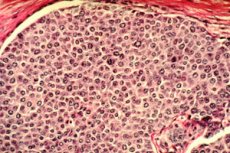Cancer can destroy itself
Last reviewed: 16.10.2021

All iLive content is medically reviewed or fact checked to ensure as much factual accuracy as possible.
We have strict sourcing guidelines and only link to reputable media sites, academic research institutions and, whenever possible, medically peer reviewed studies. Note that the numbers in parentheses ([1], [2], etc.) are clickable links to these studies.
If you feel that any of our content is inaccurate, out-of-date, or otherwise questionable, please select it and press Ctrl + Enter.

American researchers have found a "weak point" in cancerous tumors: it turns out that you can start a program of self-destruction of malignant cells and thereby cure a serious disease.
Scientists have implanted human cancer cells taken from the colon and lymphoma into rats. As a result, they noted that suppression of specific protein structures feeding the tumor causes its death.
At the moment, researchers already have ready-made medicines that suppress such a protein structure as ATF4. World medicine has every chance to soon get innovative anticancer drugs that can selectively inhibit the development of malignant cells.
The leading specialist in scientific work, Dr. Kumenis, assured that scientists are moving in the right direction and very soon they will be able to completely stop the growth of neoplasms without the possibility of tumor recurrence. Moreover, there was confidence that the discovered "weak point" is appropriate in relation to many oncological pathologies.
A huge number of cellular structures in the human body die every day, just to protect other cells from potential dangers. At the same time, the cancerous tumor ignores this behavior of the immune defense. How to force a neoplasm to self-destruct? This question has troubled scientists for a long time. And only now the team, accompanied by Dr.Koumenis, has achieved a result by connecting to ATF4 in the structures of the intestine, breast and human lymphoma and rats with induced lymphoma. It was found that ATF4 is responsible for all biochemical pathways that function simultaneously with the gene. If this direction is stopped, then the malignant cells will produce large amounts of protein and die.
When scientists were able to "turn off" ATF4 in tumors and rat organisms, it was found that pathological cells continued to accumulate the protein 4E-BP and then died as a result of stress. A similar mechanism "worked" and inhibition of the development of lymphoma and colonic cancer in animals. In human tumors, due to mutational changes in MYC, an increase in the expression of ATF4 and 4E-BP is also noted. Dr. Kumenis points out the involvement of this fact in the supposed success of the discovery.
Medicines that inhibit the biological synthesis of ATF4 (stands for activating transcription factor 4) are not new, they are produced by pharmaceutical companies and are used to treat many pathologies, including Alzheimer's and Parkinson's diseases .
According to the research results, the effect on ATF4 is effective in relation to MYC-dependent neoplasms. To date, experiments are being carried out to determine the possible side effects of such treatment in cancer patients.
The results of the scientific work are published in the Sciencedaily edition .
